May
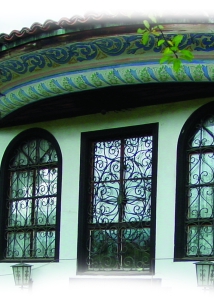 In
Latin Maius is the month of the goddess Maya, daughter
In
Latin Maius is the month of the goddess Maya, daughter
of Atlas and mother of Mercury, the messenger of the gods
and god of trade, eloquence and cunning. People call the
month of May “grassy”.
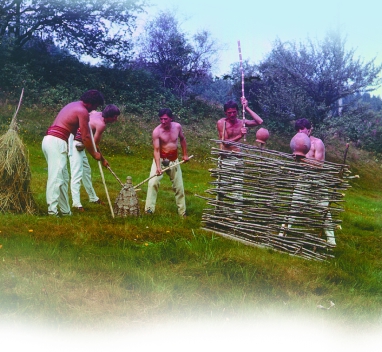
1 May JEREMIAH
(Snake Day)
Old people call the first day of May Jeremiah (Irmin day) or Zamski
day (Snake Day) and say that whoever works in the fields on this day will
be bitten by a snake in the summer. In the morning the woman of the house,
together with the other women – daughtersin- law, daughters and
the children take tongs, pokers and tin boxes. They beat them
and go round the yard from “the rise of the
sun” to “sunset” chanting: “Go away snakes and
lizards for today is Jeremiah! He will tie you with leather belts and
will take your skin with a flint!” The women go into the cellar,
go about the sheep pen, the stable and the stack-yard and believe that
during the summer no snake will crawl nearby. In some places they perform
the ritual of “driving away the dragon”. People believe that
if there is a dragon in the village he stops
the clouds and no rain falls. That is why the men drive him away. This
happens during the night when several men, stark naked and holding big
cudgels start from the eastern end of the village and end in the western
one, poking and striking all around to drive away the hidden dragon. After
walking round the whole village, the men bathe in running water and they
believe rain will no more evade their village.
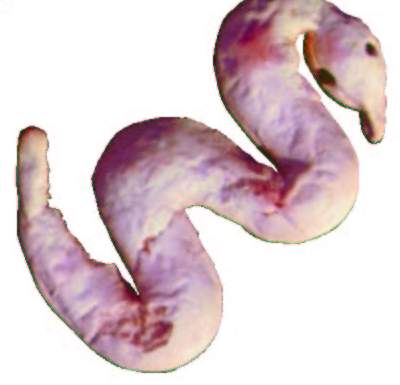 On
Snake Day young men and women stamp with bare feet the mud for pottery.
When they finish they go to the field to pick wild garlic which they bring
home to protect them against evil magic and snake eyes.
On
Snake Day young men and women stamp with bare feet the mud for pottery.
When they finish they go to the field to pick wild garlic which they bring
home to protect them against evil magic and snake eyes.
In the regions along the lower reaches of the Tundja river people sow
cabbage on this day and say: “Like snakes curl, so does cabbage”,
so that it becomes tight and tasty. In some villages of the Rhodope Mountains
Irmin Day is celebrated as protection against wolves. Hunters on this
day catch young
wolves, take them to all houses and the hosts give them wool, flour, beans
and small change. In some villages people make “karkam” –
they shear the sheep and then all the shepherds have a meal together.
2 May. Nameday of Boris, Borislav, Borislava (from “pine”).
In mythology the pine tree
is the symbol of immortality for it was considered to be the body of the
dead and resurrected
God, who changes the seasons.
5 May. Nameday of Irin, Irina, which means ‘peace’.
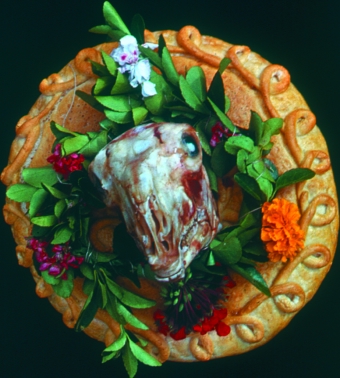 6
May GERGYOVDEN (St. George’s Day)
6
May GERGYOVDEN (St. George’s Day)
St. George's Day originates from an ancient pagan holiday connected with
the breeding of sheep and goats and their first milking. Georgius comes
from Old Greek and means ‘farmer’.
In Eastern Bulgaria, on the night before
the holiday, young people go round the
fields, then dance three left horo dances,
“bathe in dew” for health, pick branches of
pear trees and nettle leaves to decorate the
doors of the house, grain sheds, cellars, stables
and pens. They light candles and drink up three gulps of "silent
water" as medicine.
Several kinds of bread is prepared for the
holiday – cross bread, shepherd’s bread,
kolak and buns, or a special bun for Saint
George made by the young bride in the house. It is round and on the surface
there are cross-like sticks made of dough with their ends turned up. In
the middle of the cross they put a small ball of dough surrounded by a
wreath of dough. Between the arms of the cross there are four small buns
and the cross
is 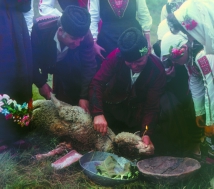 surrounded
with an “open fence” – semicircle made of dough. The
man of the house slaughters a young
surrounded
with an “open fence” – semicircle made of dough. The
man of the house slaughters a young
ewe after performing the ritual feeding and decorating it with a wreath
made of mulberry- tree branches and nettle tied with a red thread. He
marks a cross on the faces of children with the blood to be healthy and
protected against evil eyes. The bones of the ewe are buried in an anthill
to make the sheep as many as the ants. After the ritual meal the whole
village gathers in the square, where the young ones weigh themselves on
the scales, swing on the swings for health and dance quick horo dances
to multiply the cattle and make wheat grow high. Nameday of Georgi, Gergana,
Gancho, Ganka.
12 May GERMAN GRADUSHKAR (German the Hail Man)
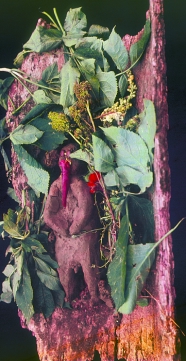 The
hail men in Bulgarian folklore are four in number, but the first and major
hail man, celebrated on 12 May is German (from the ancient Thracian germ‘hot’).
Hail is given great attention to appease German the hail man. On this
day nobody works in the fields. If someone dares to do
The
hail men in Bulgarian folklore are four in number, but the first and major
hail man, celebrated on 12 May is German (from the ancient Thracian germ‘hot’).
Hail is given great attention to appease German the hail man. On this
day nobody works in the fields. If someone dares to do
that, people stop him by force, take the oxen out of the harness and break
the cart into pieces to protect the village from the deeds of the sinner.
Old people tell the story that hail is produced by the dead in the other
world, the dead sinners. They pile it in heaps from where God takes the
icy grains and strikes with them the sinners on earth. German the hail
man sent a deaf old man to lead the hail and told him: “Lead it
to a place you have not visited yesterday!” But the old man heard:
"Lead it where you were yesterday!" That is why hail strikes
where it fell before. The hail cloud was headed by a cross eagle. People,
on seeing such a cloud, shoot with their
guns at it and frighten the eagle to take the cloud some other place.
When it starts And they believed that German the hail man will never come
again.
hailing people take an axe and a knife and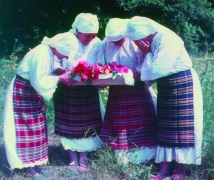 put them on the ground with the blade upwards to turn hail into rain.
To stop the hail they also order a boy and a girl, a first or last child
of two unrelated families to swallow simultaneously a grain of hail. Then
they become brother and sister.
put them on the ground with the blade upwards to turn hail into rain.
To stop the hail they also order a boy and a girl, a first or last child
of two unrelated families to swallow simultaneously a grain of hail. Then
they become brother and sister.
In the past on this day the young women made a “little German”
– a clay doll. They performed all the rituals over it like for a
dead person. The doll was carefully made and had all human parts as well
as the attributes that make a man a man for “it is a shame not to
show this”. They put it on a pan-tile, decorated it with flowers
and after the lament they buried it by the river or at a crossroad –
out of the village.
20 May SPASOVDEN (St. Spas’ Day)
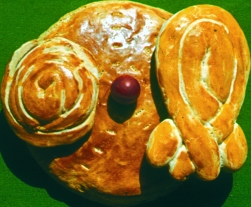 (Ascension)
(Ascension)
This is a big holiday, a bright holiday – the day of St. Spas.
For he was a healer and all living things sought medicine with him. If
it rains on this day, the rain is called “golden”, golden
for the grass and the herbs, for the trees and the fields. On the evening
before St. Spas’ Day, if a man is ill, he takes a green cup or a
green pitcher, wraps it in a new white towel, puts bread and boiled chicken
in his bundle and after sunset he starts “on the dew”. After
he sleeps in the open and the dew sprinkles on
him, he becomes healthy because that night the fairies treat all maladies.
St. Spas sends them to people. In the morning the sick person leaves a
present in the meadows where he has slept – the food brought by
him, an embroidered cloth, socks or a ribbed shirt. The shepherds, on
taking out the sheep early in the morning, feast on the treat and take
the presents, pronouncing a blessing for health. And their blessing is
to come true. On the morning of St. Spas’ Day people greet each
other for the last time with “Christ has risen!”, dye red
eggs again and give them to the neighbors. They also visit the graveyard.
There they put on the graves a red egg and leaves of walnut-tree to keep
shade to the deceased. Then they pour water, only water, for they believe
that on this day the planks of the dead are burning and they will put
out the fire with the water. After that old and young gather in the square.
They do the horo dance, mostly to songs and the first horo is always directed
to the left – to remember the deceased so they may help the living
ones. The nameday of Spas, Spaska.
21 May KONSTANTIN & ELENA (St. St. Constantine and Helena)
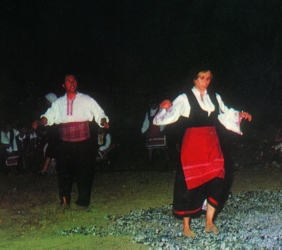 This
is the day of the nestinars (firedancers) in the Strandja Mountain region.
Their name today is only a memory, which inspires admiration for the strength
of the
This
is the day of the nestinars (firedancers) in the Strandja Mountain region.
Their name today is only a memory, which inspires admiration for the strength
of the
Bulgarian spirit. There is an old legend from Strandja about how the Bulgarians
started dancing on live coals…
It was long ago, in the times when God walked among the people. One day
he got tired of dealing with man’s deeds and thought of finding
an assistant. He wondered how to test his fidelity and at last he decided.
He made a fire burning up to the skies and summoned all unmarried young
men. When the fire came to glowing embers he said: “Whoever goes
into the fire with his bare feet, and dances on the embers, he will be
my assistant!” The young men looked at the live coals and didn’t
dare to take off their
shoes. But there was a brave man called Kostadin who stepped into the
fire, danced on the live coals and nothing happened to him. God took him
for his assistant. A year passed and Kostadin wanted to marry. God agreed
and to select a suitable bride he subjected the young girls to the same
test. Elena danced barefooted on the embers and God blessed this day to
bear the name of the two of them – Kostadin and
Elena. From then on Bulgarians dance fire-dances. From early in the morning
young and old prepare the wood for the fire. In the evening the clapper
sounds for evening service. Boys holding icons and the nestinars go round
the church three times and then stand by the spread embers. The sound
of bagpipe is
heard, the drums beat fast and the nestinars start dancing with their
bare feet. First round the fire and when “they get the spirit”
they step on the embers. The rhythm is bewitching, sacred, broken by the
piercing cry of the nestinars “Oh-h-h!”. They dance with the
“tail” icon, touch the live coals with their hands and around
them the fiery Bacchanalia spreads sparkles. The nestinar dances in the
fire without feeling pain and without burning his feet, although the temperature
of the coals is between 400 and 800 °C. There are no traces of burns
on his soles and on the next day he walks as freely and lightly as before
the firedance.
For believers this is a true proof of supernatural forces – the
saint protects him on that day. Some explain the absence of pain and burns
with external factors – wading in the mud, the coarsening of the
soles in
summer or the use of healing ointments. But ethnographers have proved
that nestinars don’t use any aids. What is it then? One of the reasons
for absence of burns is that the fire-dancers pass over the coals very
quickly, their soles coming in touch with the coals for fractions of a
second. But there is something
else, a much more important circumstance – the preparation for becoming
a nestinar. The ecstasy in the nestinars is largely attributed to fasting,
purification with water, meditation and psychological set up. The psychological
set up helps to cool the limbs, to contract the blood vessels in the feet
and reduce the sense of heat and pain respectively. The state of ecstasy
in which the nestinar falls during the ritual contributes to the physiological
reduction of pain and the effects of burning. After the dance on the live
coals the
nestinars begin a horo dance round the fire and everybody must take part
in it for health and prosperity.
This is the nameday of Konstantin and Elena, Kostadin, Kostadinka.
24 May. Nameday of Kiril, Metodi. Although the
day of the Saints Cyril and Methodius
is on 11 May, under the influence of the day of Slavic writing and culture,
people celebrate
on this day. From Old Greek: Cyril – ‘lordly’, and Methodius
– ‘one who studies, follows a
method’.
29 May. Nameday of Teodosy, Teodosia. The name means ‘God given’.
29 May ZADOUSHNITZA (All Souls’ Day)
In Thrace it is called “Spas’ All Souls’ Day”
and in Northern Bulgaria they also call it “Whitsun’s”
for it is on the Saturday before Whitsunday. In fact this All Souls’
Day is the second of all three in the calendar (the others being on the
Saturday before Mesni Zagovezni (14 February) and on the Saturday
before Michaelmas (6 November)). On this day people visit the graveyard
and in addition to pouring wine, lighting candles, giving out food, they
leave walnut-tree leaves as on St. Spas’ Day.
30 May PETDESETNITZA (Pentecost/Whitsunday)
This day is celebrated in honour of the family. After church service people
go round the
field boundaries with icons and gonfalons to protect the crops from hail
and fire.
30 May. Nameday of Emil, Emilia (from Latin, meaning ‘do
idle talk’).
31 May DOUHOVDEN (Spirits’ Day)
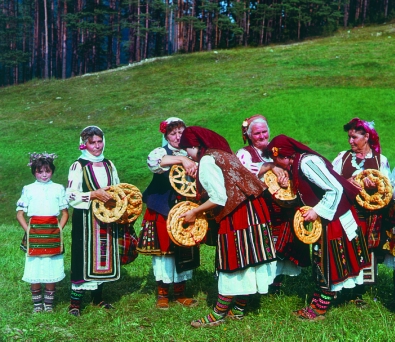 Bulgarians
believe that from Sweet
Bulgarians
believe that from Sweet
Thursday until Holy Ghost the souls of the dead are free – on earth.
They usually stay in the flowers and trees. People tempt them with leaves
of walnut-tree to get together on this day. On Spirits’ Day the
souls are brought
home and kept under lock until the next
year, on Sweet Thursday, when the doors of heaven are opened. To say good-bye
to the souls people make an offering, eat together at table, sing songs.
Spirits’ Day is always on Monday – 51
days after Easter, and the whole week is
called Mermaid Week. Until Holy Ghost people don’t burn vine branches
so as not to make the mermaids angry. Thus they will not bring down the
inflorescence which makes the grapes weak and small.